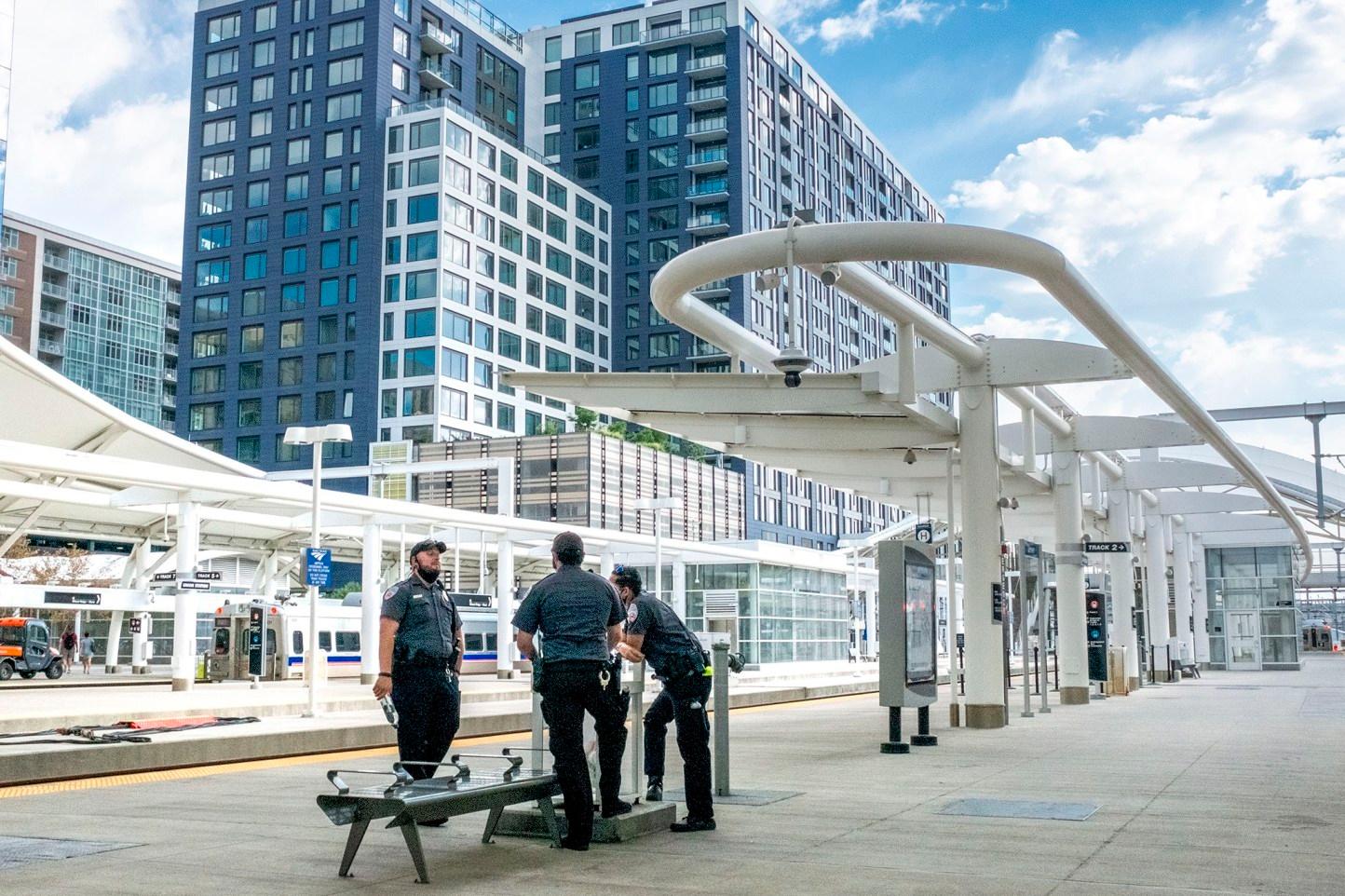The Denver City Council won't give a multinational security company, whose employees gave a Denver artist brain damage after beating him up in a Union Station bathroom, a government contract worth up to $25 million.
City council voted 7-6 to spike a proposal for Allied Universal to monitor government buildings through 2023, with an option to extend the deal through 2025. Guards would have screened people at building entrances, patrolled the grounds, provided surveillance and escorted city employees, among other things, according to city documents.
Allied Universal has a big local footprint. The city already uses the company to monitor homeless shelters, and the Regional Transportation District contracts with Allied to provide security on trains, buses and at places like Union Station, where guards can kick people out for dozing off and for not spending money.
Allied also has a big local reputation. The company inspired a play after two of its guards pleaded guilty to charges stemming from the beating of artist Raverro Stinnett in a Union Station bathroom. Stinnett, who is Black, suffered permanent brain damage, the lawsuit against Allied alleges.
The company fired the guards involved and denounced the beating earlier this month at a meeting of the city council's finance committee. Jeremy Lee, Allied's regional vice president, called the incident a "reprehensible act" that "does not represent the value of our organization both from a nationwide standpoint and certainly locally." Allied has reached a settlement with Stinnette in principle, Lee said.
Allied has allegedly been part of three other excessive force incidents around the country since 2017, according to news reports, including a death in Sacramento.
"Allied Security, y'all have a credibility problem," City Councilman Chris Hinds said Monday.
Since the beating in Denver, Allied has changed how it trains guards, company representatives said. The firm upped its training requirement, from 24 hours to 40 hours, and added 24 hours for armed guards. Allied also hired an equity consultant to audit the company's practices and agreed to take part in a new "community advisory group" aimed at bridging gaps between private security companies and the public.
But those things weren't enough to sway the majority of council members. Councilwoman Candi CdeBaca called those moves "cheap."
"This debate has taken a very disappointing turn," said CdeBaca. "We've cheapened the lives of Black people and unhoused people in a way I couldn't have imagined."
City council members Stacie Gilmore, Jamie Torres, Paul Kashmann, Amanda Sandoval, Amanda Sawyer, Hinds, and CdeBaca voted against the contract. Council members Jolon Clark, Kevin Flynn, Chris Herndon, Robin Kniech, Debbie Ortega and Kendra Black voted in favor of it.
Some members of the public felt like Allied deserved another chance. Others couldn't believe they had the option of one to begin with.
James Ginsberg, deputy director of the Department of Housing Stability and Homelessness, vouched for Allied. He said the company has "been a very positive partner" at the National Western Coliseum homeless shelter that Denver created for the pandemic.
Luis Ponce Ruiz, campaign and research director for SEIU Local 105, the union that will represent the security guards, said he supported the contract.
"It is my humble opinion that Allied security will be a safe choice ... because we know they are going to respect the contract union and hire all current employees as long as they pass the background checks," Ruiz said.
Lisa Buckley, CEO of American Automation, would have been a subcontractor for Allied. A minority business owner, she said her company "would be there to do the right thing."
"Any person that we come into contact with in our industry -- as we will call it civilians -- is to be treated with respect, to be treated with dignity, to be treated in such a way that I would like my son to be treated in this regard," Buckley said.
But other members of the public questioned why private security guards were being hired in the first place. Activist Ean Tafoya responded to Buckley during his three-minute facetime with council members.
"Listening to a private firm calling people civilians, get real! You are civilians," Tafoya said. "You are not military or police, but you act like you are policemen sometimes. We all know that privatized security has crossed the line far too many times to continue."
Tafoya suggested using the Denver Sheriff Department to secure buildings instead.
P.J. D'Amico, a friend of Stinnett's, framed the contract as disrespectful and dangerous during a meeting of the council's finance committee earlier this month.
"I have one simple question, which is why would you hire a security firm with a demonstrated history of assault?" he asked council members.
Kami Johle, director of administration for Denver General Services, said there wasn't a whole lot of competition. Securitas and Colorado-based HSS, Inc. also applied for the contracts.
"It's such a narrow field based on the size of our city and our needs that there are very few companies within the industry that can actually meet the needs of the city," Johle told council members earlier this month.
HSS has held the contract for 13 years. Johle said the city will "look at all of our options," which include revisiting HSS and Securitas and releasing a new request for proposals.











